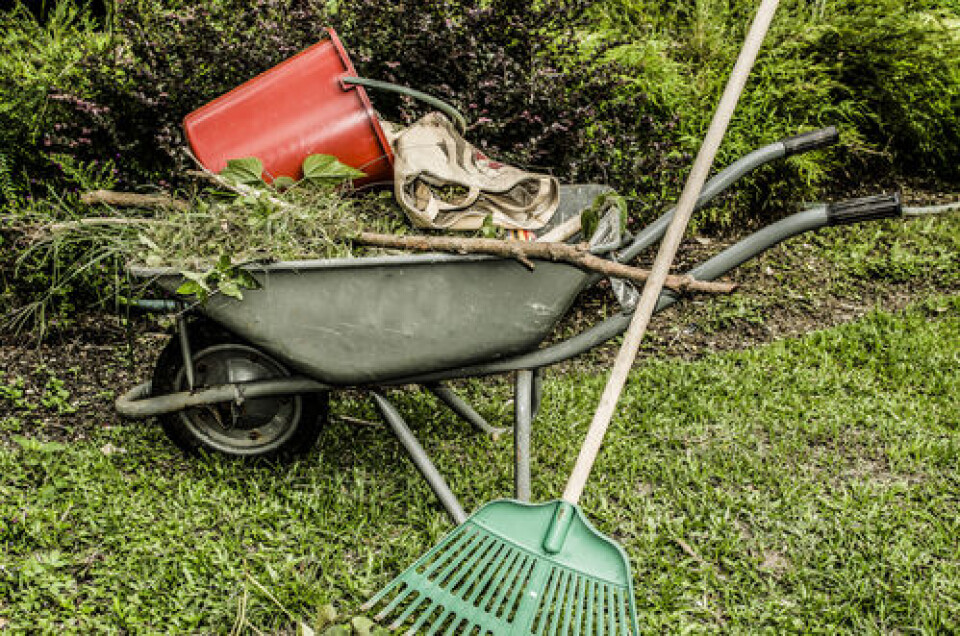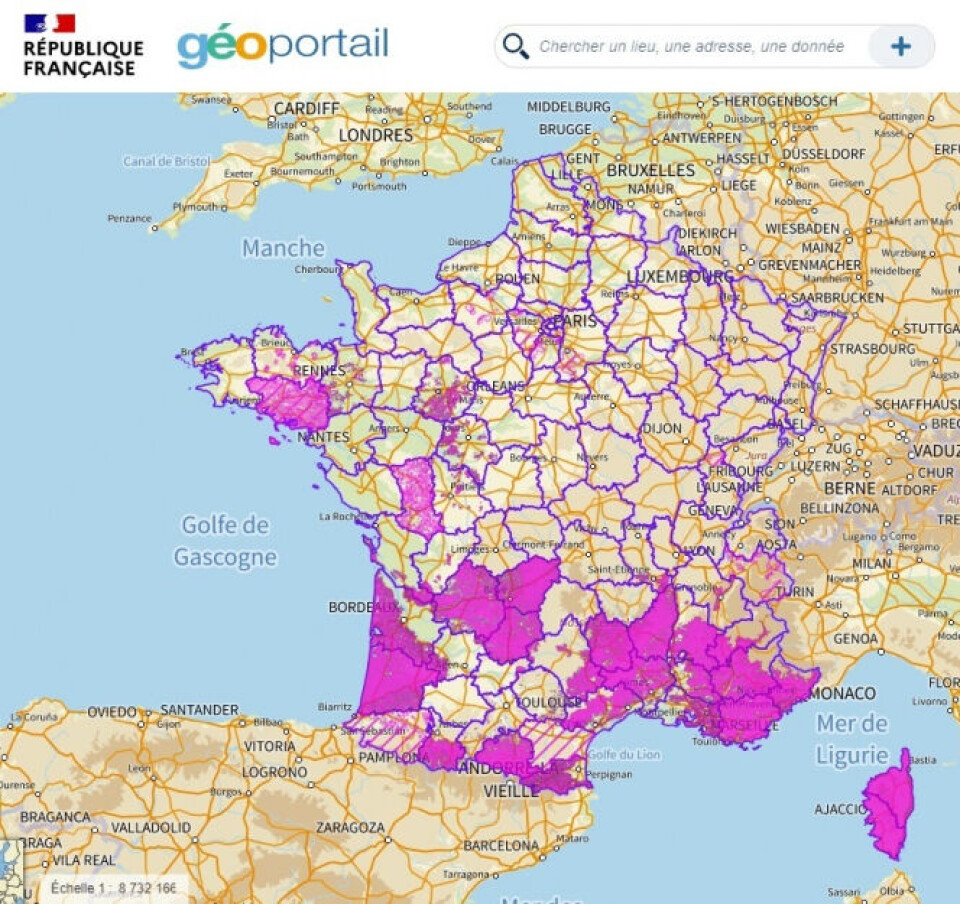-
Cars submerged, 1,100 without power: Floods hit south-west France
Three departments are on alert for flooding on Easter Monday after weekend of heavy rain
-
Approval of roadside noise cameras in France will see fines issued against loud vehicles
The devices known as meduses already exist in several cities but so far have only been ‘instructional’
-
White storks make strong return in France via nest ‘platforms’ and clipped wings
The Ligue pour la Protection des Oiseaux shares the conservation challenges in saving these birds from extinction
Why the French government wants you to clear up your garden
In some areas of France, the clearance of garden undergrowth is mandatory and refusal to comply can lead to a fine

Article published March 16, 2023 (edited June 6, 2023 to add clarifications on the rules)
Homeowners in France are being called on by the government to clear their gardens of green waste in a bid to help prevent forest fires.
The country’s ecology ministry said the majority of vegetation blazes were a result of human action.
“A vegetation fire starts from the ground and, in 9 out of 10 cases, is due to human action,” it said. “Fine elements of vegetation can easily ignite… and the fire spreads through the dead shrubs and branches from the ground to the tree tops.”
It said that these “fine elements” can include an array of usual garden waste or naturally-occurring shrubs and dead vegetation, such as grass, branches, and needles.
It said that once the fire starts on the ground, it can develop into a major emergency in fewer than 15 minutes because the fire “spreads through the foliage of the trees and from one tree to another.”
It said that a single, accidental spark can quickly cause a blaze, especially in “favourable conditions such as drought, high temperature, and wind”.
“This is why it is essential to clear the undergrowth on your property.”
The awareness campaign will last until mid-May and is aiming to reach all homeowners before the summer.
🔥 Le débroussaillement limite les départs de feux et permet d'éviter leur propagation dans les propriétés situées en forêt ou à proximité.
— Préfète du Lot 🇫🇷 (@Prefet46) March 14, 2023
Pour savoir si vous êtes concerné, contactez votre commune ou rendez-vous sur : https://t.co/yUy4w9BZg9 pic.twitter.com/GMmrpMUqXk
Is clearing optional?
In some areas of France, it is mandatory. These regulations are known as ‘obligations légales de débroussaillement (OLD)’.
OLD regulations are primarily concentrated in the southern regions (Auvergne-Rhône-Alpes, Corsica, Nouvelle-Aquitaine, Occitanie and Provence-Alpes-Côte d’Azur), and requirements are imposed at a departmental level.
Read more: Explainer: France’s obligatory anti-wildfire garden clearing rules
Where these apply, owners are typically required to clear 50-100m around their built property (house, pool house, garage, outbuildings...). This radius can also extend beyond their property if their neighbouring land is not used or maintained by another owner.
In at-risk urban areas, débroussaillage is normally also obligatory for the owners of properties situated within 200m.
A strimmer should be used to cut back on vegetation , and a nearby tree-free radius of around five metres should border your property.
Shrubs below trees should be cut, and grass in this area kept short.
For trees further away from your house (but still in the area you should be clearing), branches of the first two metres of the tree should be pruned, and there should be enough distance between branches that a fire cannot reach from one tree to another easily.
On paths and roads leading to your property, a 10m zone on either side should be cleared, where plants and dead leaves are removed.
Waste should be taken to a public rubbish tip, compacted for compost, or used for firewood if applicable. It is forbidden to burn the waste outside.
Conseil débroussaillement #3 :
— DFCI Aquitaine (@DFCIaquitaine) March 9, 2023
Une fois coupés, les #végétaux doivent être broyés, compostés ou envoyés en déchetterie. Il est strictement interdit de brûler les déchets verts.
+ d'info : https://t.co/COpGk7OEDM pic.twitter.com/7321qnU3NO
Refusal to clear the land could lead to legal action, and the owner can be ordered to pay for a third-party contractor to do the clearing instead.
Alternatively, if your OLD requires you to cut back on vegetation nearby with a fixed notice and you fail to do so, you could receive a €100 fine for each day it is not done.
Lastly, if you do not clear away vegetation and it leads to a wildfire that damages the property of another person, it can lead to a fine of €15,000 and up to a year in prison.
If some parts of the area that needs clearing is owned by a neighbour, you should ask for permission (through a lettre recommandée avec accusé de réception) to enter their land and do it for them.
If they refuse, it becomes their responsibility and you should inform the mairie of their response.
If you hire a private company to do the work for you, you could receive up a tax credit of up to 50% for the work, up to a maximum of €3,000 (theoretically meaning you could gain up to €1,500 back for the work)
You can check if your area is affected by an OLD on this official interactive map. The areas in purple are those affected.
Even if you are not in an area with an OLD, clearing is still recommended if your area is close to an OLD, or near a forest or fields.

Picture credit: geoportail.gouv.fr
How else can I help to avoid forest fires?
The government also advises the following tips:
- Keep any BBQs under control and far away from vegetation
- Extinguish all BBQs completely when finished
- Extinguish cigarettes in an ashtray and never throw them into vegetation or on the ground
- Keep all DIY or building work away from grass or dry vegetation, and have an extinguisher ready in case of a stray spark
- Avoid storing fuel, wood, gas bottles, or anything else flammable next to your home
The ministry advised that in case of a fire near your home, you are advised to call 112 or 18 (or 14 for people with hearing difficulties). Shelter in a home away from vegetation. Do not shelter in a vehicle as these can catch fire.
In case fire approaches, close all windows and cover your face with a wet towel. If you have a hose, bring it indoors. You may be able to reconnect it after the fire has passed to help dampen the ground, the ministry said.
Challenging context
It comes after some exceptionally early forest fires have already been reported this year, amid drought conditions, warmer-than-average weather, and low rainfall at the start of 2023.
Read more: Drought in France: 2023 set to be ‘very dry year’ and it starts now
The ministry added that the need to avoid forest fires is even more important now, within the context of the current drought situation, hot summers, and climate change. It said that a blaze can spread by up to a kilometre in under 10 minutes, especially on a windy day.
The year 2022 was particularly severe for forest fires, after record temperatures and deepening drought. A total of 72,000 hectares of vegetation were destroyed, including in areas that are not normally affected, such as Brittany and in the Jura.
Read also
Warm weather, drought and fires: why it may feel like summer in France
Drought map: See what water restrictions apply in your department
Why the month of March will be decisive for droughts in France
























